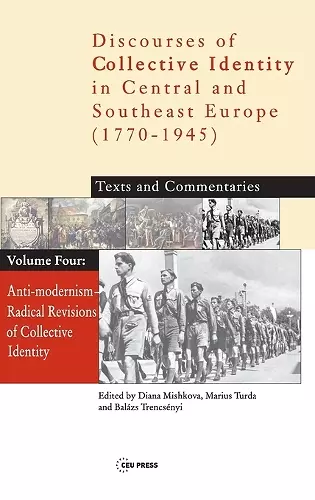Anti-modernism
Radical Revisions of Collective Identity
Balazs Trencsenyi editor Diana Mishkova editor Michal Kopecek editor Marius Turda editor Ahmet Ersoy editor Maciej Górny editor Vangelis Kechriotis editor
Format:Hardback
Publisher:Central European University Press
Published:1st Sep '14
Currently unavailable, and unfortunately no date known when it will be back

The last volume of the Discourses of Collective Identity in Central and Southeast Europe 1770–1945 series presents 46 texts under the heading of "antimodernism". In a dynamic relationship with modernism, from the 1880s to the 1940s, and especially during the interwar period, the antimodernist political discourse in the region offered complex ideological constructions of national identification. These texts rejected the linear vision of progress and instead offered alternative models of temporality, such as the cyclical one as well as various narratives of decline. This shift was closely connected to the rejection of liberal democratic institutionalism, and the preference for organicist models of social existence, emphasizing the role of the elites (and charismatic leaders) shaping the whole body politic. Along these lines, antimodernist authors also formulated alternative visions of symbolic geography: rejecting the symbolic hierarchies that focused on the normativity of Western European models, they stressed the cultural and political autarchy of their own national community, which in some cases was also coupled with the reevaluation of the Orient. At the same time, this antimodernist turn should not be confused with rightwing radicalism—in fact, the dialogue with the modernist tradition was often very subtle and the anthology also contains texts which offered a criticism of 'modern' totalitarianism in an antimodernist key.
"More than a decade in the making, these volumes represent an impressive achievement. More than that, they are a vital tool for scholarship. Few individual scholars can hope to master the languages and historical traditions required to examine identity projects and discourses in the region in comparative and transnational perspective. This collection allows us to begin to explore the potential of such a project. The imaginatively chosen and carefully annotated extracts prompt the reader to identify unexpected patterns and interactions - by no means limited to reactions to Western ideas and models - while intelligent introductions to each separate volume not only set the context but raise issues and questions that go well beyond the geographical boundaries of Central and Southeastern Europe. The editors of this series have put all scholars working on the region in their debt; they have also laid down a challenge to future scholarship to pursue the possibilities opened up by their labors." - Wendy Bracewell, University College London "A well-edited and exceptionally useful collection of identity statements from Central and Southeastern Europe over a longer time span. The editors have covered the range of the region's many languages, made informed selections, prepared excellent translations, and provided contextual introductions both to the individual extracts and to the main themes of each volume. There is no comparable work in any language; and with the appearance of the final volume in the series, dedicated to anti-modernist discourses in the first half of the twentieth century, it is worth stressing how invaluable a resource this is for teachers and researchers alike. No university library with ambitions to make the region's cultural and intellectual history available to English-speaking students should be without it." - Alex Drace-Francis, University of Amsterdam "This volume, as the entire series, is a challenging collection of essential primary sources, accompanied by introductory essays and contextual analyses in the best senses of the term: their high level of scholarship demands the intelligent engagement of the reader throughout; it invites the educated elites of Eastern Europe to throw away the crutch of myth and half-truth when promoting or interrogating their unique national identity; it demands that scholars working in the Western humanities rethink widely-held assumptions about 'Eastern Europe, what constitutes conservatism and progressiveness, and the idea of a 'normal' path to a liberal modernity. The introduction proposes a concept of 'anti-modernism' to categorize phenomena in Eastern Europe that may be difficult to grasp for those whose path to liberal democracy has not been blocked by decades of totalitarianism, since they evoke an atavistic rootedness (conservativism) but in a paradoxically futural spirit (modernism). As a result, the reader of whatever cultural background emerges with a more lucid feel for what it means to be Eastern European, modern, and human after the End of History." - Roger Griffin, Oxford Brookes University "The collection does an admirable job of addressing multiple audiences. One could imagine these texts being used to great effect in an undergraduate course and, although the contexts would likely be too dense for students at this level, they would make the volume well suited to a graduate course. The series could just as easily be used by scholars well-versed in the intellectual history of one or more of the areas represented who are looking to broaden the context of their understanding." - Slavic and East European Journal "Discourses of Collective Identity bietet eine eindrucksvolle Lekture und sei auch solchen Lesern empfohlen, die sich jenseits der ostmittel-, sudosteuropaischen Area Studies fur Nationalismusforschung interessieren. Fur jene Regionalstudien bedeutet er einen gewichtigen Versuch, das Feld fur eine kritische Ideengeschichte zuruckzugewinnen, nachdem besonders fur Sudosteuropa ethnologisch-anthropologische, kultur- und sozialgeschichtliche Fragestellungen in letzter Zeit eine dominierende Stellung einnehmen." - H-Soz-u-Kult
ISBN: 9789637326622
Dimensions: unknown
Weight: unknown
452 pages